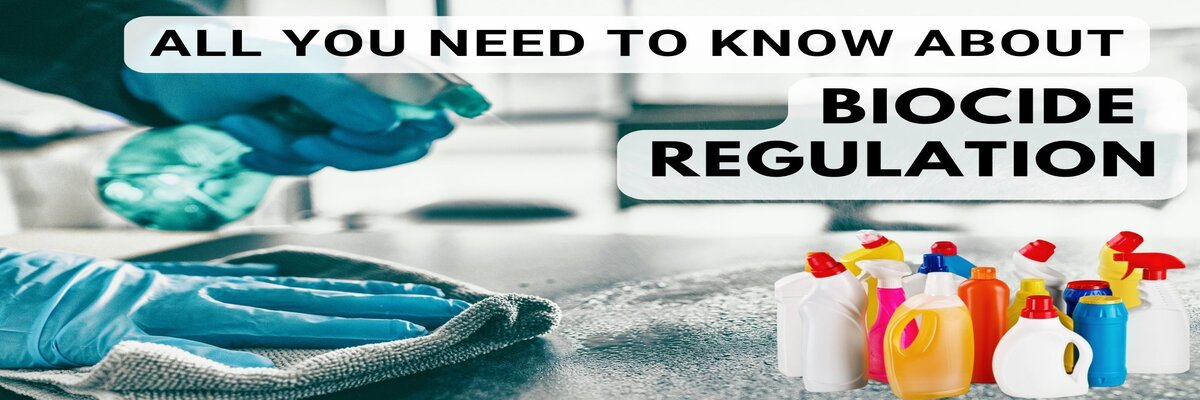
Biocides are playing a vital role in getting rid of harmful bacteria, fungi, algae, and household insects. It is beneficial to ensure food and public health safety. As per the increased demand, it has also triggered the concerns of adverse effect of its use on environment and public health. In this scenario, biocide regulation plays an important role for ensuring biocide safety in various aspects. In this blog we are covering Importance of Biocides Regulation and other important factors.
What Are Biocides?
Biocides are a group of chemical substances with antibacterial activities.. They are designed to get rid of, stop, or control living entities that pose a threat to the environment, food processing, crops or public health.
Biocides are used in a wide range of products such as –
Cleaning and Safety: They’re in products that keep things clean and protect us from germs.
Longer-lasting Products: Biocides make things like makeup and paint last longer.
Clean Water: They make sure our pool and tap water are safe by stopping germs.
Home Protection: In home materials, they stop things like mold from growing. They work like superheroes for home by keeping pests and insects away.
Applications of Biocides are invaluable, however various concerns are identified for their potential negative impact on the environment and human health.
Types of Biocides?
| GROUP 1 – Disinfectants | GROUP 2 – Preservatives | GROUP – 3 Pest Control | GROUP 4 – Other Biocidal Products |
| PT 1 – Human Hygiene | PT 6 – Preservatives for products during storage | PT 14 – Rodenticides | PT 21 – Antifouling products |
| PT 2 – Disinfectant and algaecides not intended for direct application to humans or animals | PT 7 – Film Preservatives | PT 15 – Avicides | PT 22 – Embalming and taxidermist fluids |
| PT 3 – Veterinary Hygiene | PT 8 – Wood Preservatives | PT 16 – Molluscicides, vermicides, and products to control other invertebrates | |
| PT 4 – Food and Feed Area | PT 9 – Fiber, leather, rubber, and polymerized materials preservatives | PT 17 – Piscicides | |
| PT 5 – Drinking Water | PT 10 – Construction material preservatives | PT 18 – Insecticides, acaricides, and products to control other arthropods | |
| PT 11 – Preservatives for liquid cooling and processing systems | PT 19 – Repellents and attractants | ||
| PT 12 – Slimicides | PT 20 – Control of other vertebrates | ||
| PT 13 – Working or cutting fluid preservatives |
The Importance of Biocides Regulation

1. Human Health Protection
Biocides when not used correctly or in excessive amounts can cause adverse effects on human health; like overexposure to disinfectants can lead to respiratory problems and skin irritation. Biocide residues in food products can lead to health risks if not used wisely. Regulations, enforced by regulatory agencies, help to set safe usage levels and ensure proper labeling, enabling consumers to make informed choices.
2. Environmental Protection
Biocides, which are effective against pests, are also known to show some persistence in the environment, causing harm to non-target organisms species and ecosystems like it can harm pollinators like bees, which are critical for agriculture. These chemicals can also contaminate water bodies and affect the lives of aquatic species. Regulations aim to minimize these risks by requiring thorough testing and evaluation of biocide products before they enter the market.
3. Sustainability
Regulations are made to encourage the development and use of biocides that are more sustainable and environment friendly. This includes promoting the use of bio-derived or harmless replacements and encouraging the development of technologies that can reduce the need for biocides.
4. Standardization
The classification, labeling, and safety criteria for biocidal products are standardized due to the framework provided by the biocide regulations. This helps regulators, business, and consumers to easily comprehend and control hazards which are associated with using biocides.
5. Enforcement
Regulations framed by the regulatory authorities have established a clear set of rules for biocide product manufacturers as well as for consumers. These rules ensure that best practices are used in the manufacturing and management of the biocidal products. Penalties are applied for non-compliance to discourage harmful practices.
The Role of Regulatory Authorities

- In most countries, regulatory authorities, such as agriculture regulatory agencies, oversee the approval and monitoring of biocide products.
- These organizations are in charge of determining ‘the effectiveness and safety’ of biocides as well as the ‘maximum residue limits’ for biocides in water and food.
- To make knowledgeable judgements on biocides, they work together with industrial stakeholders, research institutes, and environmental organizations.
- For instance, the Biocidal Products Regulation (BPR), developed by the European Union, establishes the criteria for evaluating and approving biocidal products.
- In the US, pesticides and disinfectants are governed by the Environmental Protection Agency (EPA). These organizations make sure that biocide products adhere to strict environmental and safety regulations.
How Auxlife can Help you with Biocides Regulation Procedure
- There are numerous documents and procedures required to fulfill for the biocide registration.
- Auxlife’s expert team of regulatory consultants execute all the processes at every step till successful approval of the product.
- To outline on the status of your active substance
- Provide you the strategic support to understand the registrability
- Setting out the regulatory compliance with Article 95 obligations
- Provide you with the interested country specific guidance and local support
- Provide you document submission and post submission support
We ensure transparency and follow the time constraints as per the requirements.
Click here to schedule a call so we can assist you effectively. This is all about Importance of Biocides Regulation keep reading.
